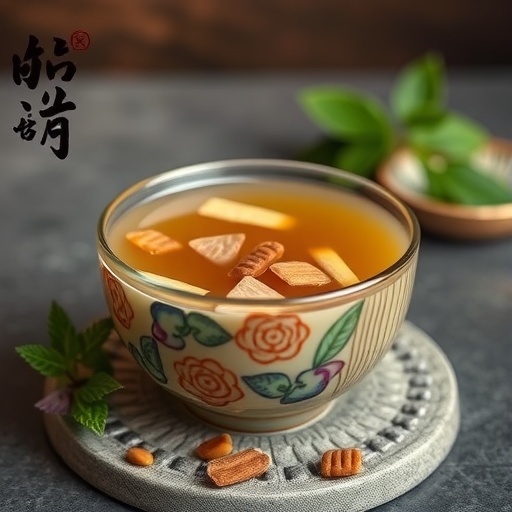Recent advancements in understanding nonalcoholic steatohepatitis (NASH) highlight the complex interplay between oxidative stress and cellular signaling pathways, particularly the AMP-activated protein kinase (AMPK) pathway. This chronic liver condition, characterized by fat accumulation and inflammation, poses a growing public health challenge, potentially leading to cirrhosis and hepatocellular carcinoma. In an exciting new study, researchers led by Yang, R., Feng, L., and Gong, Z. shed light on the therapeutic potential of Shugan Xiaozhi Decoction (SXD), a traditional Chinese medicine formulation, showing its capability to attenuate NASH through modulation of oxidative stress and metabolic pathways.
The study unveiled significant findings that suggest SXD works by reducing oxidative stress levels within hepatic tissues, thereby mitigating liver damage and inflammation associated with NASH. Oxidative stress is a key player in the pathogenesis of this condition, arising from an imbalance between the production of reactive oxygen species (ROS) and the liver’s antioxidant defense mechanisms. By addressing this imbalance, SXD may play a crucial role in restoring cellular homeostasis within the liver.
Furthermore, the research indicates that Shugan Xiaozhi Decoction may influence the AMPK pathway, a critical regulator of energy homeostasis. AMPK acts as a cellular energy sensor, promoting catabolic pathways that generate adenosine triphosphate (ATP) while inhibiting anabolic processes that consume energy. By activating AMPK, SXD appears to enhance fatty acid oxidation and improve insulin sensitivity, further supporting liver health in the context of NASH.
Animal models used in the study demonstrated promising outcomes, with results indicating that treatment with SXD led to a reduction in liver fat, inflammation, and fibrosis markers. These findings align with the growing body of evidence supporting the application of traditional medicine in modern therapeutic contexts. The translation of these strategies into clinical practice, however, requires thorough examination and validation through rigorous clinical trials.
Moreover, the authors point out that the multi-component nature of SXD, consisting of various herbal ingredients, may contribute to its efficacy. Each herb within the decoction possesses unique phytochemicals that interact synergistically, enhancing the overall therapeutic effects. This highlights the importance of not only isolating individual compounds but also understanding the holistic interactions present in traditional herbal remedies.
The significance of identifying effective therapies for NASH cannot be understated. As lifestyle diseases prevail in our society, interventions targeting metabolic pathways are essential. SXD, by providing an alternative or complementary approach, opens avenues for integrating traditional and modern medical practices for chronic disease management.
In addition to focusing solely on pharmacological effects, this research emphasizes the necessity of lifestyle modifications alongside treatment. Diet, exercise, and behavioral changes are critical components that can significantly influence the clinical outcomes of patients with NASH. The researchers recommend an integrative management strategy that encompasses dietary counseling and physical activity along with SXD administration for optimal patient outcomes.
Following the remarkable findings outlined earlier, it is imperative to further dissect the molecular mechanisms through which SXD exerts its effects. Future studies should consider employing techniques such as proteomics and metabolomics to unravel the intricate biological networks that are modulated by SXD. Such an approach would not only enhance our understanding of the underlying biology of NASH but also pave the way for the discovery of novel therapeutic targets.
The therapeutic landscape for NASH is evolving, with increasing recognition of the importance of personalized medicine. As researchers delve deeper into the pathophysiology of NASH, it becomes clearer that individualized treatment strategies, taking genetic, lifestyle, and metabolic factors into account, will likely yield better outcomes. SXD’s multifaceted approach, targeting oxidative stress and energy metabolism, aligns well with this paradigm shift.
As the burden of liver diseases linked to metabolic syndrome continues to rise, Shugan Xiaozhi Decoction emerges as a promising agent that bridges the gap between traditional therapeutic wisdom and contemporary scientific inquiry. The results brought forth by Yang and colleagues signify a significant step in recognizing the potential of herbal medicine in addressing modern health challenges.
In conclusion, this investigation into the efficacy of Shugan Xiaozhi Decoction in mitigating nonalcoholic steatohepatitis provides optimism for individuals grappling with this condition. The modulation of oxidative stress and activation of the AMPK pathway present a compelling rationale for further exploration of SXD as a part of a comprehensive treatment approach. The implications of this research extend not only to enhancing patient care but also to integrating diverse therapeutic modalities in managing complex diseases like NASH.
With ongoing research and clinical validation, the key elements of this study will hopefully lead to viable solutions, contributing to the broader field of hepatology and chronic disease management, offering hope for better quality of life for those affected by nonalcoholic steatohepatitis.
Subject of Research: Nonalcoholic Steatohepatitis and Shugan Xiaozhi Decoction
Article Title: Shugan Xiaozhi Decoction attenuates nonalcoholic steatohepatitis by modulating oxidative stress and AMPK pathway
Article References:
Yang, R., Feng, L., Gong, Z. et al. Shugan Xiaozhi Decoction attenuates nonalcoholic steatohepatitis by modulating oxidative stress and AMPK pathway. BMC Complement Med Ther 25, 422 (2025). https://doi.org/10.1186/s12906-025-05099-z
Image Credits: AI Generated
DOI: https://doi.org/10.1186/s12906-025-05099-z
Keywords: Nonalcoholic steatohepatitis, Shugan Xiaozhi Decoction, oxidative stress, AMPK pathway, traditional medicine, liver health, metabolic syndrome.




